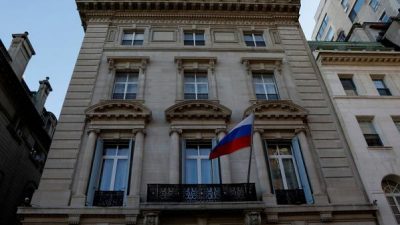Biden Declares National Emergency: U.S. and NATO Brand Russia an International Pariah

All Global Research articles can be read in 51 languages by activating the “Translate Website” drop down menu on the top banner of our home page (Desktop version).
***
The thirty-member North Atlantic Council, the political decision-making body of NATO consisting of the ambassadors of all member states, posted a statement supporting the Joe Biden administration’s declaration of a national emergency attributed to Russian actions, real or fancied.
Biden began a letter accompanying an executive order sent to the U.S. Congress today with this announcement:
“Pursuant to the International Emergency Economic Powers Act (50 U.S.C. 1701 et seq.) (IEEPA), I hereby report that I have issued an Executive Order declaring a national emergency with respect to the unusual and extraordinary threat to the national security, foreign policy, and economy of the United States posed by specified harmful foreign activities of the Government of the Russian Federation.”
In a writ of indictment that includes no fewer than seven grave – in some instances the gravest of – accusations, the letter continued:
“I have determined that specified harmful foreign activities of the Government of the Russian Federation – in particular, efforts to undermine the conduct of free and fair democratic elections and democratic institutions in the United States and its allies and partners; to engage in and facilitate malicious cyber-enabled activities against the United States and its allies and partners; to foster and use transnational corruption to influence foreign governments; to pursue extraterritorial activities targeting dissidents or journalists; to undermine security in countries and regions important to United States national security; and to violate well-established principles of international law, including respect for the territorial integrity of states – constitute an unusual and extraordinary threat to the national security, foreign policy, and economy of the United States.”
The last time such near-apocalyptic language was used in relation to Russia was after Soviet troops entered Afghanistan in December of 1979. In his State of the Union address in January 1980 President Jimmy Carter spoke these words (giving rise to the eponymous Carter Doctrine), written by his National Security Adviser Zbigniew Brzezinski and modeled after the Truman Doctrine of 1947, which signaled the beginning of the Cold War:
“Let our position be absolutely clear: An attempt by any outside force to gain control of the Persian Gulf region will be regarded as an assault on the vital interests of the United States of America, and such an assault will be repelled by any means necessary, including military force.”
Truman’s concerns were over communist activities in Greece and Turkey. Carter’s were over potential Russia influence in the Persian Gulf. Biden’s are global in their nature: everything from meddling in other nations’ elections (something his nation, of course, has never been known to do) to using bribes to influence government officials (this article was written in Chicago); to targeting dissidents and journalists with “extraterritorial activities” (Julian Assange’s opinion on this matter would be valuable) to showing lack of respect for the territorial integrity of states (it was the U.S. and not Russia that supported the secession of Kosovo, South Sudan and Eritrea in the post-Cold War era).
Even the 1941 attack on Pearl Harbor didn’t present such a life-and-death threat to the U.S. and its “allies and partners” in every part of the world as Biden would have us believe Russia does in “constituting an unusual and extraordinary threat to the national security, foreign policy, and economy of the United States.” Washington hastily declared war against Japan eighty years ago. What Biden has done today may well be the equivalent of that action.
Today NATO released a statement on, in fact a line-item condemnation of, Russia’s threat to most every aspect of life, repeating, amplifying and fleshing out Biden’s sweeping accusations:
“Russia continues to demonstrate a sustained pattern of destabilising behaviour, including its violations of Ukraine’s and Georgia’s sovereignty and territorial integrity, and continued violation, non-implementation, and circumvention of numerous international obligations and commitments, including the Budapest Memorandum. Examples include attempted interference in Allied elections, including the U.S. presidential election; widespread disinformation campaigns; and malicious cyber activities. The United States and other Allies assess that all available evidence points to the responsibility of the Russian Federation for the SolarWinds hack. We stand in solidarity with the United States. We condemn the attack on Alexei Navalny, a Russian opposition figure, with the use of a nerve agent from the banned Novichok group. Any use of chemical weapons, under any circumstances, is a clear breach of international law and contrary to the Chemical Weapons Convention. Reports that Russia encouraged attacks against U.S. and NATO forces in Afghanistan are also of concern.”
The NATO statement followed its litany of charges with the resolve for member states to consult regularly to “address Russia’s actions, which constitute a threat to Euro-Atlantic security.” It demands Russia cease what NATO characterizes as its destabilizing behavior. It also calls on Russia – and only Russia – to discontinue alleged provocations near and to deescalate tensions on the border of the Donbass and “in illegally-annexed Crimea.”
The observation that war is the continuation of politics by other means has been ascribed to Carl von Clausewitz. It is equally true that the type of political denunciation and diktat detailed above can constitute conducting war by other means. Perhaps only until the real thing arrives

No comments:
Post a Comment